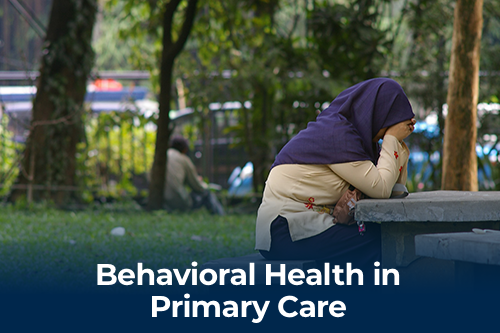"Primary care settings have become a gateway for many individuals with behavioral health and primary care needs. To address these needs, many primary care providers are integrating behavioral health care services into their setting" - SAMHSA, Substance Abuse and Mental Health Services Administration

Current Projects
Telemonitoring Enhanced Support for Depression Self-Management
James E. Aikens, Ph.D., Principal Investigator
Funded by The National Institutes of Health
The goal of this study is to develop a telephone-based system called CarePartners to improve depression outcomes by training a family member or close friend to support the depressed person from long distance. This project will determine whether CarePartners is more effective than usual care at improving the patient’s depression symptoms and other key outcomes.
Maternal Mental and Physical Health Outcomes after Stillbirth and Infant Death
Katherine J. Gold, M.D., M.S.W., M.S., Principal Investigator
Funded by The National Institutes of Health, The National Institute of Mental Health
Little is known about the long-term impact of perinatal loss on surviving mothers, its effect on subsequent prenatal health behaviors and its impact on outcomes of their subsequent pregnancies. Findings may potentially help to identify populations of women at highest risk for mental illness after such a loss, measure the impact of hospital care on maternal psychiatric morbidity, quantify the economic costs of maternal health care in the years following such a loss, and improve fetal outcomes in subsequent pregnancies.
Enhancing the Sustainability of Depression Disease Management Support for Primary Care
Michael S. Klinkman, M.D., M.S., Principal Investigator
Ananda Sen, Ph.D., Co-Investigator
Funded by The Ethel and James Flinn Foundation (212)
Designing a more efficient self-management component for M-DOCC. During the first six months of the project, we will create a series of self-management modules that can be delivered in paper or Web-based format, each linked to a self-assessment instrument, and integrate this into the M-DOCC case management software. During Year 2, we will evaluate the success of this new module by tracking the proportion of new enrollees who complete each module, identify a goal, make progress, or reach a goal, as well as the length of time enrollees remain active in the program. We will also conduct qualitative interviews of enrollees to assess its perceived value.
Health Check-Up for Expectant Moms: Computer Intervention for HIV/STI Risk and Drug Use During Pregnancy
Golfo Tzilos, Ph.D., Principal Investigator
Funded by the Eunice Kennedy Shriver National Institute of Child Health and Human Development (NICHD)
HIV and other sexually transmitted infections (STIs) risk and alcohol/drug use during pregnancy are interconnected problems - both are associated with numerous negative consequences for the woman and the developing fetus. Yet, virtually no interventions have been developed or tested to target both of these serious health concerns during pregnancy. This study will:
-
Design and develop Health Check-up for Expectant Moms (HCEM), a computer-delivered brief intervention that targets both the risk for HIV/STIs and alcohol/drug use among low-income pregnant women
-
Determine the effect of HCEM in two-group, RCT
-
Inform the development of integrated HIV/STI and substance use interventions that are cost-effective, high-reaching, and widely disseminable within prenatal care.
Computerized Intervention for Reducing Intimate Partner Violence for Perinatal Women Seeking Mental Health Treatment
Golfo Tzilos, Ph.D., Site-PI
The major goal of this program of research is the development of an IPV focused intervention that is widely disseminable for victimized perinatal women seeking mental health services.








